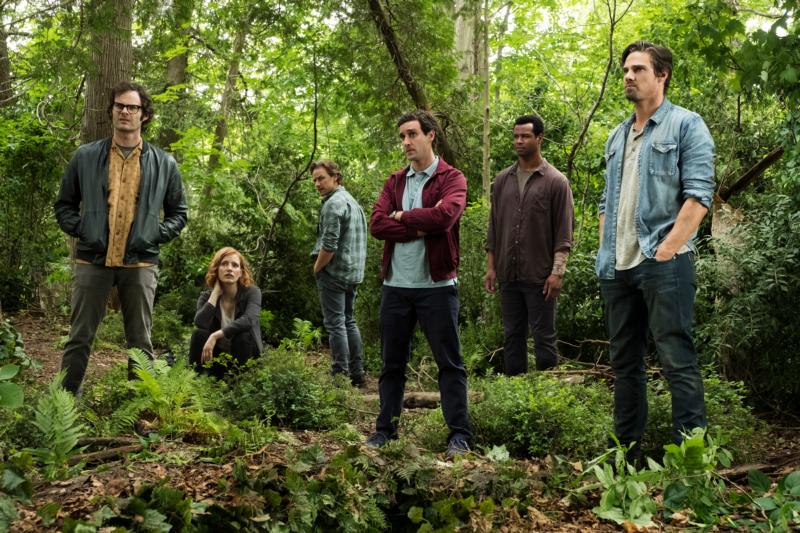
Bill Hader, Jessica Chastain, James McAvoy, James Ransone, Isaiah Mustafa and Jay Ryan star in a scene from the movie “It: Chapter Two.” (CNS photo/Warner Bros.)
NEW YORK (CNS) — The three-hour tour that went so disastrously wrong for the future denizen of Gilligan’s Island was a mere picnic compared to the patience-trying endurance test that is “It: Chapter Two” (Warner Bros.). Viewers misguided enough to subject themselves to the experience, moreover, will find that this seemingly endless follow-up to the 2017 adaptation of horror maven Stephen King’s novel is marked by off-kilter morality.
A running time of 169 minutes might possibly be justified for some particularly artful screen version of Tolstoy’s “War and Peace” or Thackery’s “Vanity Fair.” For the second and, thankfully, final installment (barring prequels) of this franchise, not so much.
With the passage of nearly three decades since the late-Eighties action of the original, the cyclically returning evil that has long beset the fictional town of Derry, New Hampshire, revives. This becomes the cue for a reunion of the self-dubbed Losers Club, a group who, as children, battled the malevolent force principally embodied — then and now — by demonic clown Pennywise (Bill Skarsgard).
[hotblock]
So sensible Mike (Isaiah Mustafa) — who, as the only member of the ensemble to have remained in Derry, has been monitoring the situation — summons his fellow Losers, the most prominent of whom are sensitive Beverly (Jessica Chastain), guilt-ridden Bill (James McAvoy) and cynical stand-up comic Richie (Bill Hader).
Director Andy Muschietti and screenwriter Gary Dauberman, both returning to the posts they held for the first film, have little to show in the way of human interest since their characters are one dimensional. Even the ostensibly enduring friendship bonding them is unengaging, based as it is on a constant exchange of often raunchy, “yo mamma” insults.
More significantly, though Muschietti and Dauberman keep the bloodletting within reasonable limits, the ethics underlying their story are bankrupt.
Thus Beverly, revealed in early scenes as a battered wife, leaves her wedding ring behind when she departs for Derry and finds true love with one of her childhood pals. However much one might sympathize with her plight, which might well justify separation, this still amounts to romanticizing adultery.
Similarly, a late sequence obliquely endorses a character’s suicide, presenting it as courageous. Since this act was committed in cold blood, in the absence of mental illness or duress and as the result of rational decision-making, portraying it in a positive light is wholly at variance with scriptural values.
The movie’s treatment of homosexuality is more nuanced since it concentrates on the genuine homophobia experienced verbally by Richie in childhood and violently by an incidental character in a scene intended to establish the resuscitation of Derry’s curse. Anything beyond the message that people with same-sex attraction ought to be treated with respect is, accordingly, only implicit.
The film contains skewed values, much gory violence, occult themes and activity, gruesome images, a flash of rear nudity, one same-sex and an adulterous kiss, about a half-dozen uses of profanity, a few milder oaths and pervasive rough and crude language. The Catholic News Service classification is O — morally offensive. The Motion Picture Association of America rating is R — restricted. Under 17 requires accompanying parent or adult guardian.
PREVIOUS: ‘The Goldfinch’ paints good ends as justifying immoral means
NEXT: Author reflects on clerical celibacy as spiritual fatherhood



Share this story